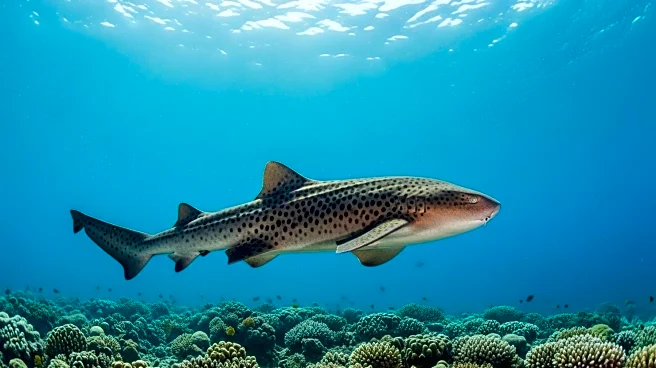What's Happening?
In a groundbreaking scientific observation, a group of leopard sharks was filmed engaging in a three-way mating event in the wild. This marks the first time such behavior has been documented outside of captivity. The footage was captured by Hugo Lassauce, a marine biologist from the University of the Sunshine Coast, during his research off the coast of New Caledonia. The event involved two male sharks mating with a female in quick succession, providing new insights into the reproductive strategies of this endangered species. The observation was part of a broader effort to monitor shark populations and understand their mating behaviors.
Why It's Important?
This observation is significant for the conservation of leopard sharks, as it provides new data on their reproductive strategies, which are crucial for developing effective conservation plans. Understanding the mating behavior of endangered species like the leopard shark can help in maintaining genetic diversity, which is vital for the species' survival. The ability to document such behavior in the wild also enhances our understanding of marine ecosystems and the role of sharks within them. This knowledge can inform policy decisions and conservation strategies aimed at protecting these critical habitats.
What's Next?
The findings suggest that the area in New Caledonia is a vital mating habitat for leopard sharks, which could lead to increased conservation efforts in the region. Researchers may conduct further studies to explore the genetic implications of this mating behavior and its impact on the population dynamics of leopard sharks. Conservationists are likely to advocate for protective measures to preserve these habitats, ensuring the sustainability of the species. Additionally, the study may prompt further research into the reproductive behaviors of other shark species, potentially leading to broader ecological insights.
Beyond the Headlines
The documentation of this mating behavior highlights the importance of field research in understanding the complexities of marine life. It also raises questions about the adaptability and resilience of endangered species in changing environments. The ability of female sharks to store sperm and choose optimal conditions for reproduction could have significant implications for conservation strategies, emphasizing the need for habitat protection and sustainable management practices.










